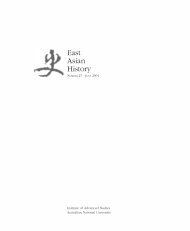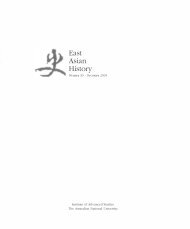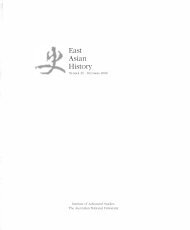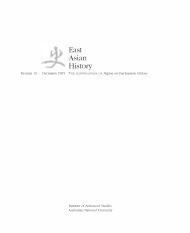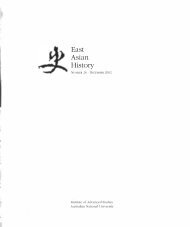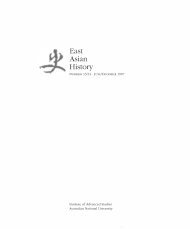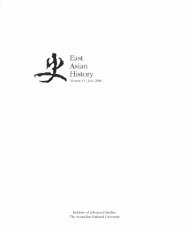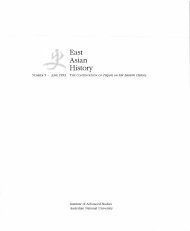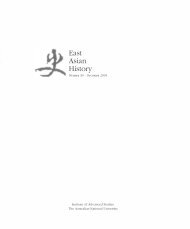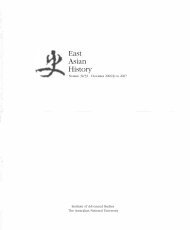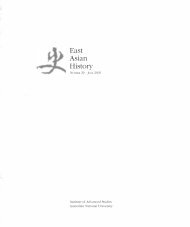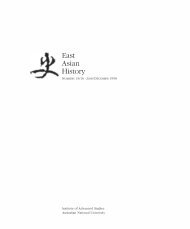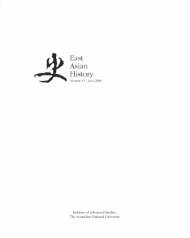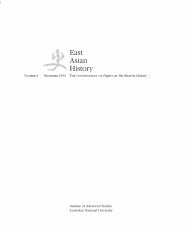Mujaku Dochu (1653-1744) and 17th-Century ... - East Asian History
Mujaku Dochu (1653-1744) and 17th-Century ... - East Asian History
Mujaku Dochu (1653-1744) and 17th-Century ... - East Asian History
Create successful ePaper yourself
Turn your PDF publications into a flip-book with our unique Google optimized e-Paper software.
MUJAKU DOCHU<br />
33<br />
for their yearnings for their homel<strong>and</strong>. Thus <strong>Mujaku</strong> both accepted <strong>and</strong><br />
attacked Obaku. Lin concludes that the causes for <strong>Mujaku</strong>'s attitude can<br />
be summed up as deriving from the relations of Obaku with his master<br />
Somon, <strong>Mujaku</strong>'s Japanese chauvinism <strong>and</strong> Lung-ch'i's consciousness<br />
of his former homel<strong>and</strong>, <strong>Mujaku</strong>'s strict outlook as a scholar attempting<br />
to correct existing scholarship <strong>and</strong> practices, the internal problems of<br />
Myoshinji <strong>and</strong> Obaku, <strong>and</strong> the influence of the Record of Constant<br />
Response. 41 Lin thus sees <strong>Mujaku</strong> as rather cold <strong>and</strong> calculating, if not<br />
deceptive, in his behaviour towards Doto, claiming he wrote no poem of<br />
mourning.42 But in fact <strong>Mujaku</strong> did lament Doto, although not passionately,<br />
as that would violate Buddhist principles on mourning (see below),<br />
writing two poems. The first was:<br />
Not confused by the spoiling <strong>and</strong> deceiving roar of the wind,<br />
His reputation <strong>and</strong> knowledge extensive, he aided me in conversing on<br />
emptiness.<br />
From now, on the twists <strong>and</strong> turns of the Narabigaoka road,<br />
When I ask of matters there will be no-one to whip this piebald horse<br />
33],i!(.43<br />
The first line seems to refer to the popularity of Obaku, <strong>and</strong> the second is<br />
an honest assessment. The piebald horse may refer to <strong>Mujaku</strong> himself, <strong>and</strong><br />
mean there was no-one left to stimulate his investigations, although the<br />
word tama/gyoku.3S. here could mean "your", that is, Doto. Later, in the<br />
same month, Doto's confidant, Gettan J'31S. of Jikishi Monastery lHJ§,<br />
died, <strong>and</strong> his ashes were interred next to those of Dot6. <strong>Mujaku</strong> wrote:<br />
I strongly remember their intellect <strong>and</strong> adherence to Elder Yin-yiian<br />
[Lung-ch'il.<br />
In a small valley of Narabigaoka their virtuous years were venerated.<br />
In the second month of autumn when the moon has set <strong>and</strong> idle clouds<br />
dispersed.<br />
Their stupas face each other <strong>and</strong> I must record that their departure place<br />
is the same.44<br />
This poem pictures <strong>Mujaku</strong> left alone to grieve the two savants in Narabigaoka-an<br />
underlying sadness alluded to by autumn, the setting moon,<br />
<strong>and</strong> the idle clouds-the mourning monks (unsui *, lit., clouds <strong>and</strong><br />
water) <strong>and</strong> curious onlookers having departed. I suspect <strong>Mujaku</strong> had a<br />
genuine affection for Dot6 <strong>and</strong> was probably not merely pumping him<br />
for information to use against Obaku. Thus, his personal feelings are more<br />
revealed in the poems, while the Outside Record was a warning to the<br />
Myoshinji monks of the problems he saw in the rising popularity of Obaku,<br />
<strong>and</strong> the Recorded Conversations with Saiun of Narabigaoka (Narabigaoka<br />
Saiun kidan f1ill*2;WD-one of a number of kidan-was a record of<br />
some scholarly conversations.<br />
In any case, <strong>Mujaku</strong>'s relations with <strong>and</strong> knowledge about Obaku were<br />
primarily via Dot6, <strong>and</strong> involved complex layers of personal connection,<br />
41 Lin, "<strong>Mujaku</strong> Oochu," pp.32-47; for the<br />
Obaku geki, see also Baroni, Obaku Zen,<br />
pp.147-56, for slightly different interpretations,<br />
<strong>and</strong> translation, see pp.205-17. Baroni<br />
seems to treat the text as one, simply in two<br />
parts, whereas Lin considers the Japanese<br />
text a later product. Baroni, Obaku Zen,<br />
p.148, states the work was probably meant<br />
for internal Myoshinji consumption as it was<br />
never published.<br />
42 Lin, "<strong>Mujaku</strong> Oochu," pp.38-9.<br />
43 Houdo kogyoshU, MSS, 8. 177a-b, aged<br />
60.<br />
44 Houdo kogyoshU, MSS, 8.177b, aged 60.



